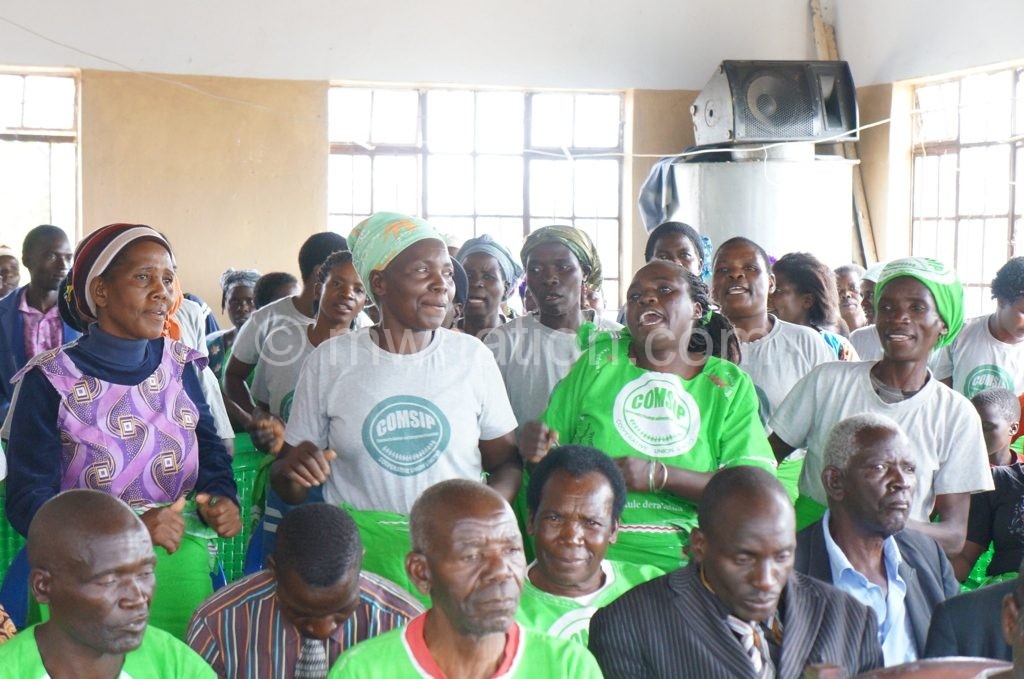Winning big with savings and investments
When her husband abandoned her and her four-year-old baby in 2010, Bertha Khumula was left with two choices. Give up on life or do something to provide for her daughter.
“I had nowhere to start from because during my marriage life, I depended on my then husband. Life was really tough for us to the extent that managing a day’s meal was a nightmare,” she says.
Khumula, a resident of Mwengo Village in Traditional Authority (T/A)Somba in Blantyre, says she joined Mtikita Comsip in 2010 with K2 000.
“I was selling zitumbuwa at the nearby Chadzunda Trading Centre in Blantyre. After some time, my savings from the group accumulated from my public works wages and I have been able to grow my business,” she says.
Khumula boasts of an iron roofed house and seven goats thanks to the savings from Comsip.
“We no longer sleep on empty stomachs nowadays as we used to in those days. We can now eat as we please and we have food stocks to carry us to the next harvest season,” she said.
Over the past seven years, Khamula has grown her business from only selling zitumbuwa to cosmetics.
Members of Comsip are now using their savings and investments to increase their incomes and improve their livelihood.
Iness Solomoni, bookkeeper of Mtikita Comsip from T/A Somba in Blantyre, says since its establishment in 2010, many livelihoods have been transformed.
Solomoni says that at the start of the group in 2010, they only had K81 000 worth os savings which have now grown to K2.9 million in 2016 with a membership of 40.
“The cooperative has received trainings aimed at increasing its productivity in financial literacy, business management and proper procurement procedures. We now have a piggery unit which was established in 2015 and has since managed to sell over 53 pigs earning over K500 000.
“With this, we have been able to share the profits among ourselves and start small businesses which have since bred positive results,” she said.
Looking ahead, Solomoni said the group hopes to buy a minibus as well as own a shop at nearby Chadzunda Trading Centre.
Comsip evolved out of the Malawi Social Action Fund’s (Masaf) public works programme, which encourages savings and investment as a key tool for its members to withstand sudden losses of income and food insecurity in a region often hit by climate change that impacts on agriculture and food.
Comsip has since registered 262 cooperatives with a membership of over 128 000 nationwide.
Comsip Cooperative Union exists to deliver flexible savings and investment products and services to economically empower Malawians to improve their livelihoods through member owned savings and investment cooperatives.
The client base for the union includes rural and peri-urban communities eager to engage in sustainable enterprises at individual, group and cooperative levels.
Comsip Cooperative Union facilitates the transformation of social capital into economic capital aimed at creating a framework within which communities could form cooperatives and mobilise savings from within themselves.
The members of the primary cooperatives then utilise their savings to prudently invest in productive ventures in various sectors such as small-scale businesses and agricultural production.
To be effective, Comsip Cooperative Union creates entrepreneurship culture among members of primary cooperatives in micro businesses and agribusiness, thus making the rural poor more productive in generating income and eventually more likely to save.
These business enterprises are categorised into production, processing, trading and services.
Comsip operations manager Suzan Kondowe said the performance of Comsip as a cooperative union has been good with an increased membership and improvements in livelihood over the years.
She said Comsip is banking on the review of cooperative policy to enhance the performance of cooperatives in the country.
The policy, which was developed in 1997, was aimed at developing cooperative sector to improve income levels, delivery of essential services and create employment opportunities in the country.
“The main challenge that we have been facing is that there has not been that political will which has resulted in the lack of implementation of our brilliant ideas on how best we can run the cooperatives,” she said.
In an earlier interview, Ministry of Industry, Trade and Tourism spokesperson Wiskes Nkombezi said they expect to incorporate more sectors into the cooperative sector through the yet-to-be revised Cooperative Development Policy and the formulation of an implementation strategy.
He said the ministry is banking on the revised policy to incorporate more sectors of the economy into the cooperative society.
“In other countries, they have many sectors in the cooperatives such as banks and butcheries, but here in Malawi, we have not penetrated into other sectors.
“We want to incorporate more sectors into the cooperatives society because this will not only boost the economic activities, but also help grow the economy,” he said.
Nkombezi said that the idea of reviewing the 20-year policy was to make cooperatives vibrant.




